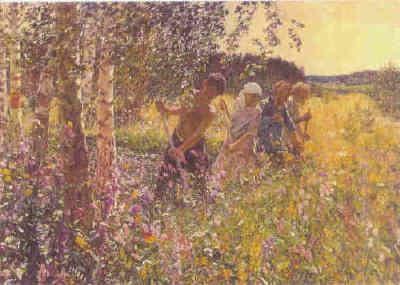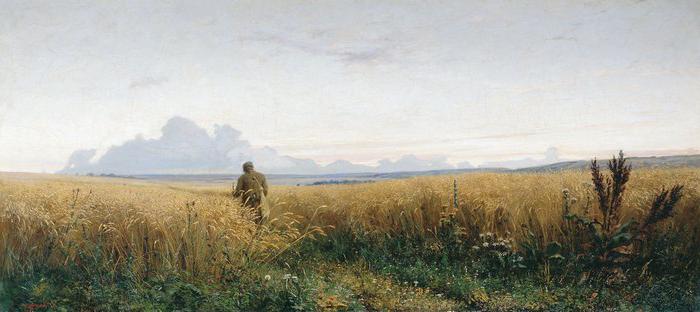1921 year. Paris. Emigration. After the October Revolution of 1917, this was a forced matter. And there are many reasons for this. They fled from the horrors of the Bolshevik regime, and from hunger and cold, and from chaos, war, from lice and epidemics, from evening searches and night shootings ... Ivan Alekseevich Bunin also fled. For the same reasons, but there was something else, much stronger and deeper - this is self-exile. It forced him to carefully forget the past, then to embellish it, or, on the contrary, to thicken tones and colors so that the experience did not seem too colorless and dull. It also put a lot of tragedy into his subsequent life. The work of Bunin's “Kossa” is one of the clear evidence of this.
Memories
In the novel by Ivan Bunin, “The Life of Arseniev,” there is one noteworthy phrase: “Memories are something so terrible and painful that there is even a prayer for salvation from them ...” Yes, the memories are different: bright, warm, bright, like a summer sunny day ... And they can be gloomy, heavy, like a low leaden sky, threatening not only to pour cold rain, but to crush all life. The latter and have a special property to pursue. Even if you ran far ahead, you’ll still overtake, seize and paralyze. They pursued I. Bunin.
Different moods
The endless atrocities, the desecration of all that is holy, the sea of blood around and, most importantly, the impunity for what was done - all this tormented him: “And how vile, absurd, bastard Russia has bothered the world with its vilenesses and misfortunes!” In the work “Cursed Days” (1918-1920) painful memories painted his Motherland in an infinitely dark color. It seemed that all the connecting threads were torn, like the pages of old books, and nothing and no one was able to make him see at least one bright spot. But, apparently, the prayer was read, and Ivan Alekseevich abandoned the "journalism" hostile to October, and found the strength to return to his soul, to writer's work and love for the motherland. Russia inside him won. Bunin’s short story “Kossa”, written in Paris in 1921, is a clear confirmation of this. In it, of course, one can still hear longing and pain for what has been lost, but this is only a background that skillfully sets off the basic tones - a youthful, sublime love for Russia along with a deeply conscious and mature person. And now more ...

Plot
The plot of the story (I. Bunin, “Kossa”) is very simple. These are memories of the past, of the day — the late afternoon of the June day, when the author, who is also the narrator and protagonist, met in a birch grove with pigtails - ordinary Russian men. They came from where, mainly Ryazan, to work. These memories are light, airy, reminiscent of a haze on an early summer morning in the forest. They are continually interrupted by the author’s thoughts about the lost greatness of Russia, about the Kossians, about the Russian people, about the Slavic soul, about how she can sing - and you can’t forget, and there’s nothing to compare with ...
“Kossa”, Bunin: analysis of the work
The story begins with the phrase: "We walked along the high road, and they mowed in a young birch forest near it - and sang." And immediately after it a new paragraph: “It was a long time, it was an infinitely long time, because the life that we all lived at that time will not return forever ...” Hopeless melancholy and sadness are heard in every word, in every breath-comma , in every sound. “It was a long time ago,” says the author (Ivan Alekseevich Bunin, “Kosca”), and here he strengthens, puts another smear of gray paint - “forever”, and another at the very end - “will not return forever” so that the reader not just understood, but disappeared along with the main character in his memories and in the endless mental pain caused by them .
Who are we?
We continue the topic of the article “Kossa” (Bunin): analysis of the work. ” The narrative in the story is conducted in the first person, but often the pronoun "I" sees itself in the plural person: "we walked ...", "we lived at that time ...", "There were fields around us ...". What is it? Whom does Ivan Bunin (“Kosca”) mean by the word “we”? We are the author himself, his family and friends, and all those who suffered a tragic fate abroad, who were forced to renounce their homeland, flee with the only luggage behind them - memories and nostalgia, because already “never forget this night before, "these thick herbs and flowers, this field air, and" never understand, fully express what is most important, what is their wondrous charm. " And the further these endless fields, this “wilderness of the middle, primordial Rus” both in time and in space, the stronger, deeper and more silent love for it. “Sorry, goodbye, dear friend!” And, darling, oh goodbye, dearie! “Forgive me, goodbye, my dear, unfaithful, whether your heart has become blacker than dirt!” - the words of the song of the Kossians coming now sound like a prophecy.

Who are they?
Who are “they” in the work (I. A. Bunin, “Kosca”)? A summary of the story will help to clarify this important issue. So, as mentioned above, a picture from the past opens before the reader: a bright, picturesque hinterland of central Russia. Everything arouses admiration in her. And the road leading to the horizon, and “wild myriad flowers and berries”, and grain-growing fields ... Time seemed to have stopped. And suddenly, in the middle of this paradise, out of nowhere, “they” appear - mowers, majestic, like epic heroes, carefree, friendly, “hunt for work”. Mow and sing. “They” - this is Russia. Let her be in “onuchi”, “shoe covers”, “shirts”, but free and beautiful with her special, incomparable beauty. It is noteworthy that the word "pigs" is used only two times, and "they" - twenty-five. This says only one thing: that Russia, about which Bunin dreams, is lost - the end of God's forgiveness has come.
Song
And the song “them” is a Russian soul, direct, incomparably light, fresh, strong, naive in ignorance of their talents, and therefore strong, powerful, and sometimes bold. She does not cry out with her voice, but only with "sighs, uplifts of a healthy, young, melodious chest." “They” sing, “we” listen, unite and merge together. Yes, there is this real blood connection between “us” and “them”, clouds, air, field, forest and the whole distance ...
Article on the topic “I.A. Bunin, “Kossa”: a summary of the work ”has not yet come to an end. Despite the hopelessness of the song, they sang "they" with "inescapable joy." Why? Yes, because it is impossible to believe in hopelessness. This is unnatural to the very nature of man, to everything that lived, lives and continues to live around us. "Forgive me, goodbye dear little dear!" - “they” sang, “we” sang, and none of us could believe that there really was neither a path nor a road to our home. Inside, everyone had some kind of inborn higher knowledge, the realization that, wherever we were, we were not truly separated from our infinite native Russia, our native sun would still shine in our native bottomless blue sky.
Woeful "I"
As mentioned above, the narration is mainly conducted in the first person, but in the plural, and only twice is the lonely "I" heard. The first time the author, driving past the Kossians, saw their modest dinner, could not resist, came closer, and greeted the "good fellows": "I said: bread and salt, hello ...". In response, they invited him to their modest table. But, taking a closer look, he was horrified to find that "they" were carrying spoonful of fly-agaric mushrooms from cast iron. What kind of strange food? No wonder Bunin included this seemingly insignificant episode in his story. He is very symbolic. The Russian tradition of hospitality always requires accepting an invitation to sit at a common table, not rejecting and not shying, otherwise there is no equality, there is no unity. He refused. So, there wasn’t that unanimity, that wholeness between “us” - “them”, about which they talked a lot and dreamed before the revolution. Perhaps that’s why it happened ...

The article on the topic “I.A. Bunin, "Kossa": a summary of the work. " Another woeful “I” sounds at the end of the story: “Another, I say, was in this song ...” And then he summarizes all of the above and lived through. Yes, in those distant, already infinitely distant times, irreversible, both "they" and "we" felt the most unlimited happiness. But the fairy tale came to an end: self-made tablecloths curled up, prayers and spells were forgotten, and the limit of God's forgiveness came ...
Stylistics
Bunin’s short story “Kossa” is written in so-called rhythmic prose, since the form of the work is a lyrical monologue-memory. The lyric sound is enhanced by iambic sound, which, in turn, alternates with omissions of stresses. The rhythm finds its expression in the repetition of the words “they”, “we” and the words “charm”. The latter is six times in the eighth and ninth paragraphs. This also manifests the phenomenon of anaphora, that is, unanimity at the beginning of several sentences: "Its charm was in the responses ..."; "The charm was in that unconscious ..."; “The beauty was that we were all ...”, etc. This technique brings the author’s feelings to a climax.
At the lexical level, contextual synonyms are also observed (the forest is young and the road is big, Russia and the soul), personification (Russia - only her soul could sing), associative synonyms (Russia - the chest), periphrasis (all Russians are “these are children of their Motherland”, regardless of social status)
That's the whole tale, and the whole story (IA Bunin) "Kossa". The summary is good, but it is better to open the text itself and admire the amazing syllable of Ivan Alekseevich Bunin.